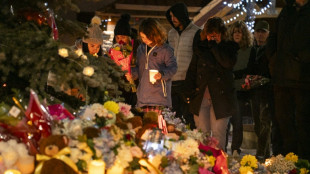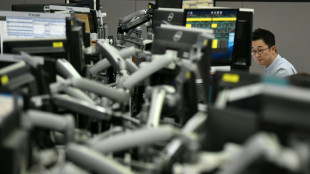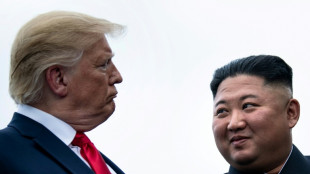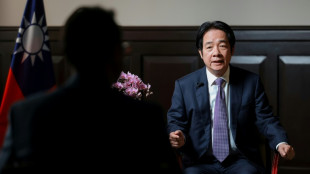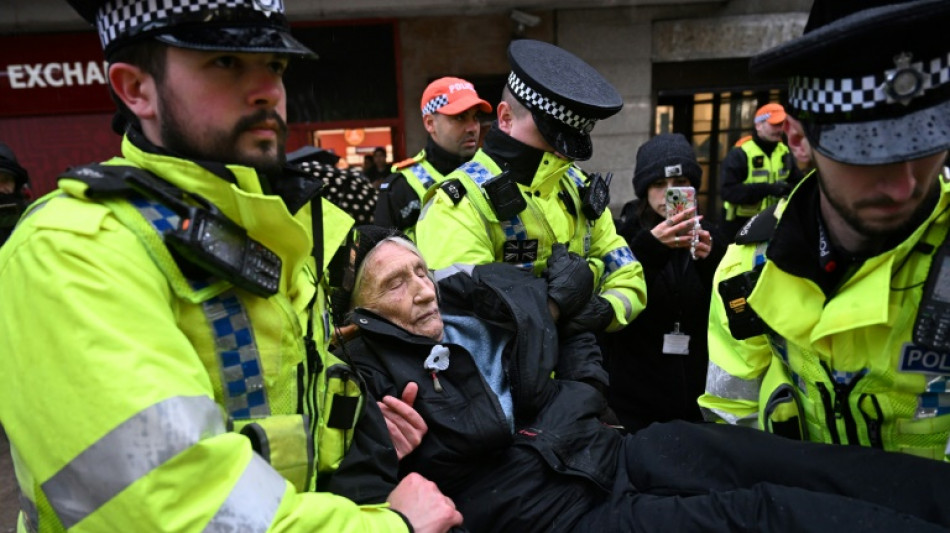

Palestine Action launches court bid to overturn UK government ban
The co-founder of activist group Palestine Action will Wednesday challenge a UK government ban under anti-terror laws that has led to mass arrests, sparking free speech and civil liberties concerns.
United Nations human rights chief Volker Turk has said the ban "appears disproportionate and unnecessary", while Europe's human rights watchdog, the Council of Europe, criticised "excessive limits" on the right to protest.
The UK government proscribed the pro-Palestinian group in July days after activists, protesting the war in Gaza, broke into an air force base in southern England.
Prosecutors have said they caused an estimated £7 million ($9.3 million) of damage to two aircraft at the base.
The legal action brought by the group's co-founder Huda Ammori at London's High Court is expected to last Wednesday and Thursday, with a third day to be set at a later stage.
The ban -- which makes being a member of the group or inviting support for it a serious criminal offence punishable by up to 14 years in prison -- has resulted in at least 2,300 arrests, according to protest organisers Defend Our Juries.
Those arrested include students, teachers, pensioners and even an 83-year-old retired vicar, with many carried away from the protests by police.
According to London's Met Police, so far 254 people have been charged with a lesser offence which carries a sentence of up to six months.
The proscription under the Terrorism Act 2000 means the group has been added to a list that also includes Al-Qaeda and Hezbollah.
The interior ministry, or Home Office, has accused Palestine Action of conducting an "escalating campaign" involving "sustained criminal damage", including to Britain's national security infrastructure.
It also accuses the group of "intimidation, alleged violence and serious injuries".
- 'Not non-violent' -
At a court hearing on Thursday, prosecutors alleged a Palestine Action activist struck a police officer with a sledgehammer at an Israel-based defence firm's UK site after breaking into the factory in western Bristol in August.
Foreign Secretary Yvette Cooper, defending the ban in August, said some supporters of the group "don't know the full nature of this organisation because of court restrictions on reporting while serious prosecutions are under way".
"But it's really important that no-one is in any doubt that this is not a non-violent organisation," she said, adding the government had received "clear security assessments and advice" before opting for a ban.
Set up in 2020, the group's stated goal on its now-blocked website is to end "global participation in Israel's genocidal and apartheid regime".
It has mainly targeted weapons factories, especially those belonging to the Israeli defence group Elbit.
Since the ban came into force on July 5, protesters have held a string of rallies at which they have held up signs saying: "I oppose genocide, I support Palestine Action".
Award-winning British film director Ken Loach has called the ban on Palestine Action "absurd" and accused the government of being complicit in Israel's "incredible crimes" in Gaza.
"This level of political repression is not what we expect in a democracy -- it's the kind of tactic typically associated with authoritarian regimes around the world," a spokesperson for Defend Our Juries said.
Areeba Hamid, co-executive director of Greenpeace UK, said the government had broken past pledges that the Terrorism Act would not be used to prosecute people taking direct action.
"Classifying a protest group as a 'terrorist organisation' should send a chill down your spine," Hamid said.
"Progressive change is rarely made by any government without pressure from the public, and removing our right to protest is an erosion of democracy."
K.Costa--IM
